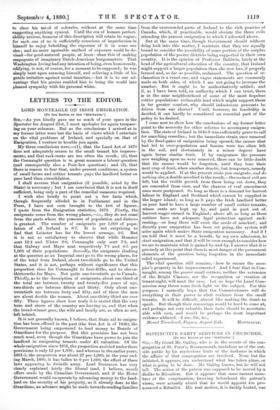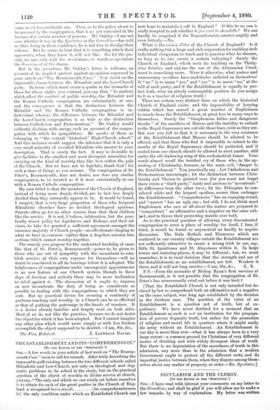DISTINCTIVE PARTY SERVICES IN CHURCHES.
[TO THE EDITOR OF THE " SPECTATOR:1
SIR,—My friend Mr. Oakley, who is in the secrets of the con- gregation of St. Peter's, Bournemouth, tantalises us of the out- side public by his mysterious hints of the darkness in which the affairs of that congregation are involved. None but the initiated, it appears, can understand what has taken place, or what is going to be done. Mr. Oakley knows, but he will not
• tell. The action of the patron was supposed to be moved by a dislike to Ritualism. But it appears that some earnest mem- bers of the congregation, knowing beforchDnd the patron's views, were actually afraid that he would appoint too pro- . flounced a Ritualist. His real motive, it is darkly hinted, was some much less creditable one. Then, as to the policy about to be pursued by the congregation, that is as yet concealed in the bosoms of a certain number of persons. Mr. Oakley—I am not sure whether it was in the Spectator or the Guardian—has told us that, being in their confidence, he is not free to divulge their scheme. But he seems to hint that it is something which their opponents, when they know it, will not like. So, for the pre- sent, we can only wait for revelations, or watch as spectators the denoucnitnt of the drama.
But in the meantime, Mr. Oakley's letter is welcome, on account of its implied protest against an opinion expressed in your article on " The Bournemouth Case." You insist on the impassable chasm between the Ritualists and the Low-Church party. In terms which must create a qualm in the stomachs of those for whose rights you contend, you say that, " In matters which affect the conduct of public worship, the Ritualist and the Roman Catholic congregation are substantially at one, and the consequence is that the distinction between the Ritualist and the Roman Catholic congregation is in- finitesimal, whereas the difference between the Ritualist and the Low-Church congregation is as wide as the • distinction between Catholicism and Protestantism?' Mr. Oakley would evidently disclaim with energy such an account of the congre- gation with which lie sympathises. He speaks of them as belonging to " the central historical' High-Church school." And this instance would suggest the inference that it is only a very small minority of so-called Ritualists who answer to your description. That is surely the fact. It may be desirable to give facilities to the smallest and most divergent minorities for carrying on the kind of worship they like best within the pale of the Church. But we have not to legislate, thank God ! for such a state of things as you assume. The congregation of St. Peter's, Bournemouth, does not desire, nor does any similar congregation, to be treated as if it were substantially at one with a Roman Catholic congregation.
My own belief is that the members of the Church of England, instead of being more deeply divided, are in fact less deeply divided than they outwardly appear to be. It would be found, I suspect, that a very large proportion of those who frequent Ritualistic churches have no decided theological opinions. Parents often go for no other reason than that their children like the service. It is not, I believe, infatuation, but the prac- tically wisest policy for legislators, and Bishops, and their• ad- visers, to take for granted a sufficient agreement amongst the Immense majority of Church people—an affectionate clinging to what we have in common—rather than a hopeless scission into sections which cannot worship together.
The remedy you propose for the undoubted hardship of cases like that of St. Peter's, Bournemouth—power to be given to those who are out of sympathy with the incumbent to esta- blish services at their own expense for themselves—will no doubt be considered in all its bearings before it is adopted. The helplessness of congregations under uncongenial appointments is no new feature of our Church system, though in these days of freedom and activity there may be more inclination to rebel against it. The discussion of it ought to impress on new incumbents the duty of being as considerate as possible in dealing with the congregations to which they are sent. But no practical device for securing a continuity of partisan teaching and worship in a Church can be so effectual as that of putting the patronage in the hands of trustees. It is a device already familiar and largely used on both sides. Most of us do not like the practice, because we do not desire the object for which it has been adopted. Bat I cannot imagine any other plan which would more simply or with less friction accomplish the object supposed to be desired.—I am, Sir, &c.,



































 Previous page
Previous page